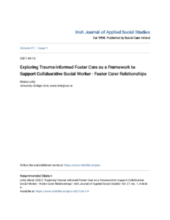Demographic Data
|
Sources: World Bank, UNDP, UNAIDS, DHS 2013 |
Displaying 2591 - 2600 of 14391
This paper suggests a new framework, Trauma-informed Foster Care that was developed to reflect the experience of the Irish foster care system, may be helpful to support more collaborative practices between foster carers and social workers in an Irish context.
This paper examines the lived experiences of children who interacted with tourists in a performance-based orphanage in Siem Reap, Cambodia.
Este seminario web es el segundo de una serie de la Plataforma de colaboración global Transforming Children's Care. En el seminario web, Philip Goldman de Maestral International presentó una nueva guía sobre gasto público y cuidado de los niños producida por Changing the Way We Care, que está diseñada para fortalecer la capacidad de las agencias gubernamentales en países de bajos recursos para preparar un marco presupuestario sólido.
This webinar is the second in a series for the Transforming Children's Care Global Collaborative Platform. In the webinar, Philip Goldman from Maestral International presented new guidance on Public Expenditure and Children’s Care produced by Changing the Way We Care, which is designed to strengthen the capacity of government agencies in low resource settings to prepare a sound budgetary framework.
The conversation of this webinar focused on the root causes of why there are millions of children globally growing outside of families, and discussed some of the proven ways of strengthening families and communities to provide a safe and nurturing environment for the world’s most at risk and vulnerable children.
This webinar is the second in a series for the Transforming Children's Care Global Collaborative Platform. In the webinar, Philip Goldman from Maestral will present new guidance on Public Expenditure and Children’s Care produced by Changing the Way We Care.
In this webinar, panelists will discuss the implementation experiences and emerging lessons of COVID-19 response strategies of seven programmes that prioritize nurturing care and early childhood development in their work.
Through an analysis of the impact of the pandemic on the Italian and Greek reception systems and social interventions with unaccompanied minors (UAMs), the authors of this study utilised a multiple embedded case study approach within a comparative analysis, to identify key changes in the main services which should be guaranteed to minors—namely, hosting/housing, guardianship, foster care, family/relatives reunification, school integration, language, job training for care leaving, and preparation for leaving care after 18 years.
This study aimed to test whether a home‐visiting intervention could improve early attachment relationships between adolescent mothers and their infants living in poverty in Brazil.
A systematic review was conducted to examine the effectiveness of interventions and practice models for improving health and psychosocial outcomes of young people in residential care and to identify relevant knowledge gaps.


